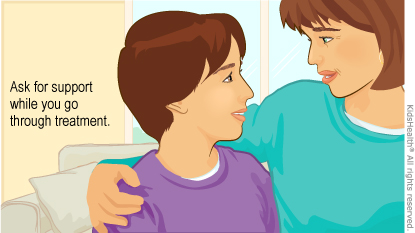Anorexia (also called anorexia nervosa) is an eating disorder where someone eats very little, is very fearful of gaining weight, and sees their body differently than others do. Treatment for anorexia can help you have a healthy weight, develop healthy habits, and change the way you think about food and your body.


Follow the care team's recommendations for:
Help your overall well-being by:

You:

You:
You can also call or text 988 or go to 988lifeline.org to reach the 988 Suicide & Crisis Lifeline. Someone is always available to help, 24/7.

What causes anorexia? The exact cause of anorexia isn't clear. It probably happens from a combination of a genetic (inherited) tendency, psychological issues, and social pressure to be thin.
What are the symptoms of anorexia? People with anorexia have an extreme fear of weight gain. They try to eat as little as possible and might exercise too much or do other things to lose weight. They may become very thin. They may also feel cold or tired, have dizziness or fainting, hair loss, dry skin, and trouble concentrating. Girls may stop having periods. Without treatment, anorexia may lead to weak bones, anemia (not enough red blood cells), and life-threatening heart problems.
While more common in females, anorexia can affect males too.
How is anorexia treated? Anorexia is treated by a care team of specialists that includes doctors, behavioral health providers, and a dietitian. These experts work together to monitor the person's medical health, provide counseling, and make dietary recommendations.
Some people can be treated at home with close follow-up with the care team. Others may go to a special program during the day to get help. Some people need to stay in the hospital to make sure they get the treatment they need.